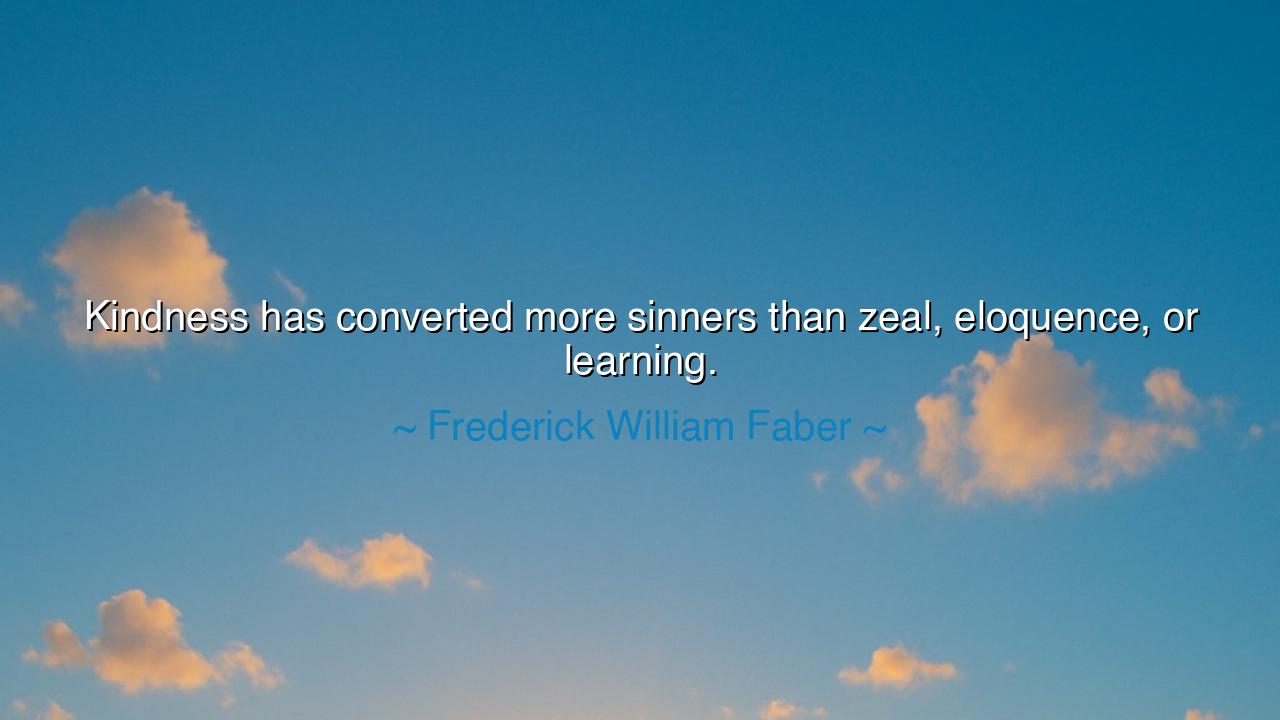
Kindness has converted more sinners than zeal, eloquence, or






“Kindness has converted more sinners than zeal, eloquence, or learning.” — Frederick William Faber
In this tender yet commanding truth, Frederick William Faber, the 19th-century theologian and hymn writer, speaks to the heart of all spiritual and moral transformation. His words rise like a quiet hymn against the noise of pride and argument, reminding us that the power to heal, to inspire, and to redeem does not lie in the sharpness of intellect or the passion of conviction, but in the gentle art of kindness. Faber saw what the ancients, too, had known — that the soul does not open to be conquered, but to be loved. The mind may resist logic, but the heart melts before compassion.
The origin of this wisdom lies in Faber’s own life and ministry. A man of deep learning and devout faith, he was at first a stern scholar of theology, enamored with truth as an idea. Yet, through the years of guiding others — through failures, confessions, and the brokenness of humanity — he came to see that it was not eloquence that healed, nor zeal that transformed. He learned that one kind word, one merciful gesture, could do what entire sermons could not. For kindness, unlike doctrine, does not speak to the mind alone — it touches the soul. It is the language of the divine made human, the silent proof of love’s reality.
The ancients understood this sacred power. The philosopher Aesop, in one of his fables, told of the sun and the wind who quarreled over which could compel a traveler to remove his cloak. The wind blew fiercely, but the harder it blew, the tighter the traveler clutched his garment. Then the sun shone gently, and under its warm rays, the traveler removed his cloak willingly. So it is with kindness and zeal. Harshness may force obedience, but warmth wins the heart. True conversion — whether of belief, of behavior, or of the human spirit — arises not from fear or argument, but from being seen, accepted, and loved.
Consider the story of Saint Francis of Assisi, whose life is a living testament to Faber’s words. Francis did not preach in grandeur, nor debate with scholars. He walked barefoot among the poor, embraced the leper, and treated every living creature as kin. His kindness shone so brightly that even the proud and the cynical were drawn to him. The world saw in him the face of love unarmed — a compassion that asked for nothing and gave everything. His way converted not through zeal or learning, but through presence — through the quiet, radiant truth that mercy is stronger than might.
Faber’s quote also holds a mirror to our age, which worships the intellect and admires eloquence. We live in a world that debates more than it listens, that judges more than it forgives. But kindness, though often seen as small and simple, remains the most revolutionary force on earth. It does not shout, yet it moves mountains of bitterness. It does not demand, yet it transforms hearts. For in every human being — even in the hardest or most wayward — there remains a spark that longs to be treated with gentleness. When touched by kindness, that spark awakens, and the soul remembers its own goodness.
There is a divine humility in kindness. It does not seek victory; it seeks healing. It does not say, “I am right,” but, “You are loved.” And in that love lies its power. Faber’s message, then, is not only for the preacher or the philosopher, but for all who walk among others in this world. Whether in families, friendships, or nations, kindness is the bridge that spans every divide. The zealous burn out, the eloquent are forgotten, the learned are surpassed — but the kind are remembered in eternity, for their gentleness becomes the soil in which other souls take root and grow.
So, dear listener, take this lesson as a sacred charge: practice kindness, even when it feels small, even when no one notices. Speak softly when anger tempts you to roar. Forgive when pride urges you to condemn. Offer warmth where others offer indifference. Let your strength be measured not by how fiercely you win arguments, but by how deeply you touch hearts. For as Faber reminds us, it is kindness — quiet, patient, divine — that has done more to redeem the fallen and uplift the weary than all the speeches, doctrines, and battles of men. The sword may compel obedience, but only kindness can awaken the soul.






AAdministratorAdministrator
Welcome, honored guests. Please leave a comment, we will respond soon